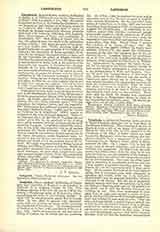

Langham, SIMON, cardinal, Archbishop of Canterbury and Chancellor of England, b. at Langham in Rutland; d. at Avignon, France, July 22, 1376. Nothing is known of his early life, but in 1346 he was already a Benedictine monk of Westminster Abbey, representing his house in the triennial chapter. In April, 1349, he was made prior, and in May he became abbot. In this office he proved very successful, ruling well and carrying out many works, including the completion of the cloisters. He became treasurer of England on November 21, 1360, and Bishop of Ely on January 10, 1362. Before consecration he was also elected Bishop of London, but he refused this see, preferring Ely. On February 19, 1363, he received the great seal as chancellor, and he was the first to speak in English, when opening Parliament. He was appointed Archbishop of Canterbury on July 24, 1366, and received the pallium from the pope on November 4, having previously resigned the chancellorship. As archbishop he was vigilant against false doctrine, condemned certain propositions taught at Oxford, removed one Wycliffe—not the well-known heretic of that name—from the headship of Canterbury Hall, and censured the demagogue-priest, John Ball. Blessed Urban V created him Cardinal of St. Sixtus, September 27, 1368. His acceptance of this dignity without the king’s leave offended Edward III, who seized the Canterbury revenues on the plea that Langham had by his act forfeited the see. Langham resigned the archbishopric on November 27, and early in 1369 joined the pope at Avignon, being succeeded at Canterbury by Whittlesey. Subsequently he regained the king’s favor, but did not return to his native country, though he held several English preferments in succession, such as the archdeaconries of Wells and Taunton. Gregory XI made him Cardinal–Bishop of Palestrina in July, 1373, and in the following year the monks at Canterbury again elected him as archbishop. The pope refused to confirm this, alleging that he could not spare the cardinal from Avignon. When the Curia was about to return to Rome in 1376, Langham obtained permission to go back to England, but he died before he could carry out this intention. Three years after his death, his remains were translated from Avignon to Westminster Abbey to which he had bequeathed his residuary estate. He was an up-right man, and an able, if stern, ruler.
EDWIN BURTON

